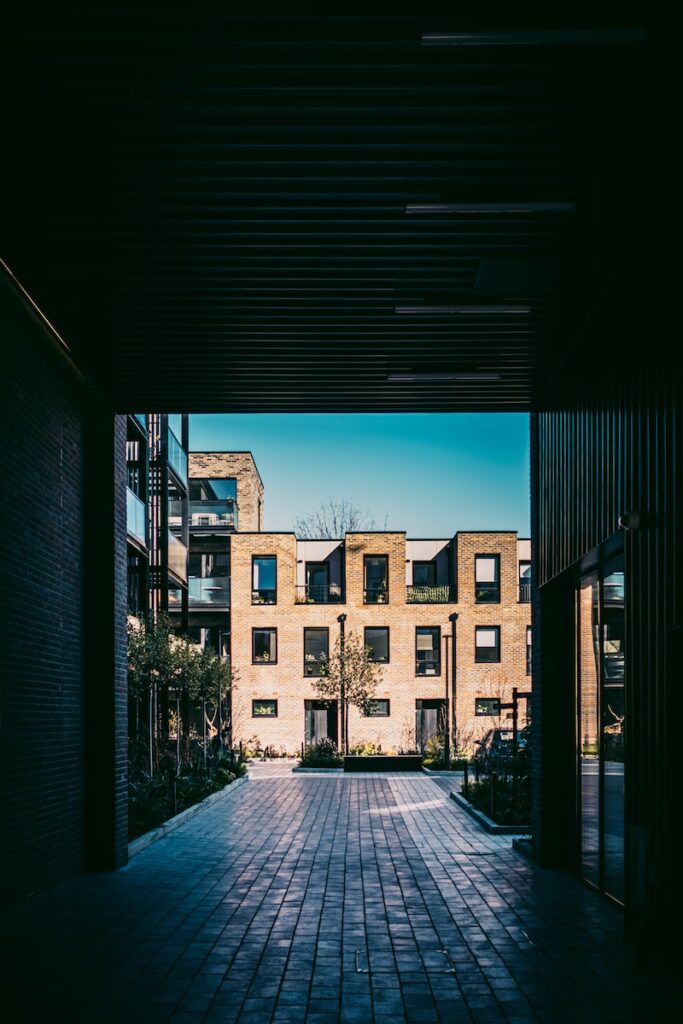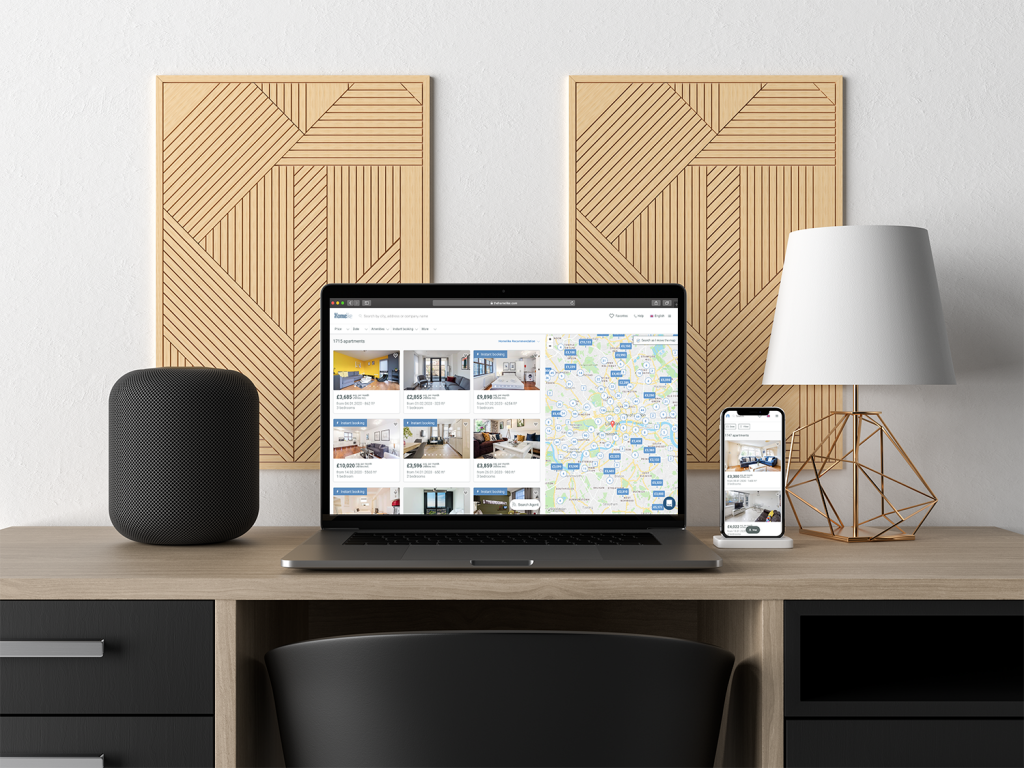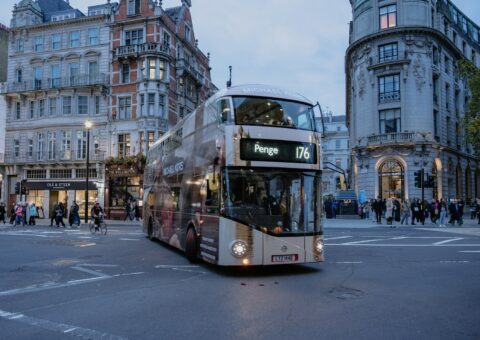Steps to finding your ideal student accommodation in London
Recently recognized as one of the best student cities in the world, it’s no surprise that budding academics are eyeing up one of London’s many universities for their dream course. In fact, the city is home to some of the most highly-regarded universities in the world, including Imperial College London and University College London, which both stand in the top ten globally. Couple these impressive stats with a myriad of world-renowned museums, art galleries, and shopping streets, and London is a dream destination for many students.
If you’re already at the stage of searching for how to find student accommodation in London, we can assume you’ve already secured your place at one of these top educational institutions. However, now the real hard work begins – finding that home from home in a new city or even new country for some.
To help you out on your journey, we’ve broken down the process of how to find a flat in London for students so you can start looking forward to building your new life in the Big Smoke.
Let’s go.
1. Choose your preferred neighborhood
London is an incredibly diverse city, and your experience here will largely be shaped by your choice of neighborhood. Many students choose to live close to their campus building to make the commute as easy as possible, whereas others base their choice on budget constraints, personal preferences, and other factors. If you do want to be relatively close to your campus, here are a few tips for the top five universities in the city:
- Imperial College London. With the main campus based in West London, the neighborhoods of Chelsea, Westminster, Paddington, and Kensington will put you within walking distance of the university.
- University College London. Based in North London, Camden, Soho, and Clerkenwell are good choices for students of UCL.
- King’s College London. Stretching across the River Thames, student accommodation in Covent Garden, City, South Bank, and Lambeth are popular neighborhoods.
- London School of Economics and Political Science. Tucked away in Holborn, try Farringdon, Fitzrovia, or St James’ to be a stone’s throw away from your lecture halls.
- Queen Mary University. Based in East London, anywhere from Bow to Bethnal Green, White Chapel to Hackney will put you in close proximity to the university’s campus.
However, while being just a short stroll away from campus is a priority for some, other many want to prioritize London neighborhoods that are better suited for the younger demographic with a higher population of students. Here are a few popular picks, no matter which university you may find yourself going to.

- Camden
Famous for its sprawling markets, booming nightlife scene, and ever-developed canal, Camden has become one of the staple neighborhoods for any students moving to London. Sitting in Zone 2, rental prices are relatively high here, but you’ll have plenty of entertainment right on your doorstep, including the recently renovated Koko nightclub, the famous Blues Kitchen for live jazz, and the Roundhouse, one of the city’s best live music and theater venues. Plus, the Northern Line, Overground, and many bus routes that pass through the area make it easy enough to reach other parts of the city.
- Shoreditch
London’s original hipster neighborhood, Shoreditch, can be characterized by super cool markets, underground eateries, chic bars, and sprawling murals that adorn the laneways. If you’re the creative type that loves to explore new parts of the city each day, this could be a great choice. Accommodation is in high demand, but you’ll find a mixture of private and university halls, which can make your life a little easier during the search.
- Bermondsey
Sitting just south of the Thames and not far away from the foodie goodness of Borough Market is the industrial neighborhood of Bermondsey. Famous for the Bermondsey Beer Mile and its multicultural streets, you’ll not only find reasonably priced accommodation here, but you’ll also be able to find a range of specialty food here, from authentic Lebanese to raw herbs and spices from across the globe. What’s more, you’ll be within easy access to the Jubilee and Northern Line, opening up a wealth of exploration opportunities in the capital.
- Brixton
Nestled into the southern neighborhoods of London, Brixton has retained its affordable rental prices despite its popularity. With a thriving multicultural community, world-class music venues, and great transport links via the Victoria Line, this could be a great option for those on a budget. If you are concerned about travel to university, we’d recommend this one for King’s College London students.
- Docklands
A recently renovated area of London, the docklands has been transformed from a heavily industrial part of the city to a hub of modernity with just an edge of warehouse chic. Neighborhoods within this area include the modern Canary Wharf, the water-bound Isle of Dogs, and historic Wapping. While it doesn’t have a major tube stop, it is connected to the DLR, which will get you to most corners of London.
If you’re interested in knowing more about London neighborhoods, read more about
2. Understand the types of rentals available
Understanding how to find student accommodation in London is slightly different from your typical rental search in the city. In fact, students have a lot more options available to them, especially if they’re in their first year of university. Flats in London tend to be divided into two types; halls of residence and private accommodation. Here’s a little about what you can expect from both.
- Halls of Residence
Halls of Residence are usually available to first-year students only. However, you may be able to join a waiting list for spare rooms in later university years. These are types of accommodation organized by your university and are usually located not far from campus. They can provide a seamless way to ease into life in London and make it a little easier to meet fellow students.
Halls of Residents come in all different shapes and sizes, and your university will probably send out a brochure of options at least six months before you are due to move to London. Normally, you will need to fill in a form with your top three choices of accommodation, along with your budget and room preferences, and you will be assigned a room based on this.
Within these rooms, you’ll normally be assigned a room and will share living spaces and kitchen facilities with a group of other students. Monthly rent costs tend to include all utility bills and basic furnishings, as well as Wi-Fi. You’ll also be given the option to pay a little extra for a room with an ensuite, and you can even pay for catered accommodation which will include two meals each day.
- Private Accommodation
After your first year at university, you will, more than likely, need to move into private accommodation. This opens up the whole of the London rental market to you, giving you a wealth of choices to find your perfect home away from home.
When it comes to understanding how to find student accommodation after your first year, the first step is knowing exactly what type of rentals are available to you. Once you have all of that information, you can make an informed decision as to what will suit your wants and needs the closest.
- Furnished Accommodation
The convenience that furnished accommodation in London brings makes it some of the most common types of rental that you’ll find in the city. Complete with all of the basic furniture someone could need, including a bed, sofa, fridge, dining table, and other expected amenities; it can take the hassle out of moving into new accommodation. In the case of most furnished apartments, you’ll still need to buy smaller utilities for the kitchen, such as cooking utensils and other decorative items for the flat. You’ll also need to organize your own utility bills, Wi-Fi, and council tax. This can be particularly beneficial for anyone on a shorter course, such as a one-year master’s degree.
If you’re looking for a completely furnished apartment in the city, it can be worth looking into the world of serviced apartments in London. Taking the concept one step further, serviced flats in London offer stylishly furnished spaces with everything from kitchen appliances and Wi-Fi to cleaning services and an on-site gym included.
- Short-Term Rental
Short-term rentals in London are a little harder to come by, with most traditional rental properties requiring at least a 6-12 month contract period. Saying that, there are ways to bypass this red tape and find short-term student accommodation in London. Short-term rentals are usually essential for those only studying in London for one term on a program such as Erasmus or master’s students who may only be on a 9-month course.
Flatshares, which we will discuss later, and serviced apartments are usually your best bet when it comes to shorter rental properties. While the former is a much more casual arrangement, the latter usually comes as a package. Essentially, this means that you will agree to a set rental period (usually between 1-6 months), and this price will include your monthly rent, utility prices, cleaning fees, and any other amenities.
- Aparthotel
This is a good option for students doing short term courses in London. Similar to a serviced apartment, aparthotels offer the full package when it comes to accommodation in London. Sitting somewhere between living in your own apartment and enjoying the luxury of a hotel, you can have all of the comforts of home with the convenience of cleaning services, onsite restaurants, and gyms, and not having to worry about utility bills.
Of course, these types of apartments do come at a price that is higher than average, but they also come complete with a hassle-free moving experience. There’ll be no need to make that obligatory visit to IKEA to furnish apartments and no need to hunt around for the best price on your utility bills and Wi-Fi packages. Everything will simply be included in one monthly fee.
- Coliving
Due to the rising cost of living in London, coliving is becoming a very popular option amongst students and young professionals. Generally, co-living in the city comes in the form of flat and house shares. Similar to halls, you’ll usually have your own room (sometimes with an ensuite) but will share spaces such as the living room and kitchen with your housemates.
Websites such as SpareRoom make it easy to connect with others with an empty room in their property. Usually slightly more casual arrangements, this type of flat share situation can suit those only looking for short-term rentals. What’s more, utilities such as electricity, gas, Wi-Fi, and water will have already been set up – but you will be expected to pay a monthly contribution towards these costs on top of your rent.
- Unfurnished
Similar to furnished accommodation, you’ll also find heaps of unfurnished accommodation across London. This is particularly popular for longer-term rentals with contracts of at least 12-18 months, as it allows you to put your own spin on your home.
Typically, unfurnished rental properties in London will come with a built-in kitchen, but you will need to purchase all other amenities, including a washing machine/dryer and refrigerator. Some properties may not come with curtains either. Of course, all rental properties are different, so it’s worth reading the fine print to find out exactly what is and isn’t included in your particular rental.

3. Figure out the London property types
If you’re moving to London from another city, the minefield of property types available might have you baffled. Here’s a quick guide to the jargon you will hear while you’re researching how to find student accommodation in London:
- Detached. A type of single-standing house, with no other buildings sharing their walls, is very hard to come by in London. Short on space, most new properties are built conjoined, and older properties that are detached tend to be on the higher price scale.
- Semi-detached. Semi-detached houses are a little more common throughout the city, especially in Zone 2 and outwards. This type of property shares one wall with a neighboring house and tends to be a Victorian-style townhouse – an iconic type of architecture linked with London.
- Terraced. In London’s outer suburbs, you’ll find rows and rows of brown brick houses that have two attached neighboring properties. Generally speaking, these are older properties that date back as far as the 16th century.
- Flat. Apartments, or flats as they are more commonly known in England, are rife throughout London. They come in all shapes and sizes, from modern purpose-built properties to Victorian townhouses split into smaller flats. Generally, they are between 1-3 bedrooms.
- New build. With the increasing demand for space in London, there is always a new build development taking place somewhere. These are properties that are generally quick to build and have all of the modern fittings you would expect.
4. Decide which amenities are most important for you
So, you’ve finally got your head around the type of accommodation available to you in London, so what next? One of the most important things when it comes to how to find student accommodation in London is making sure you have everything you need for a comfortable life. For this reason, before you actively start searching, we’d recommend putting together a list of things you must have and things that you can negotiate on.
Here are a few questions to ask yourself:
- Would you prefer the building to have laundry facilities?
- What kind of air conditioning or heating system would you prefer?
- Do you need a parking spot close-by?
- How important is having a private space, whether it be a garden or a balcony?
- Would you prefer a 24-hour front desk in your accommodation?
- Is having a gym onsite essential?
- How much storage space do you need inside the flat?
- Do you have a four-legged friend coming with you?
- What kind of ambiance do you prefer in the local area?
- Does the area’s Wi-Fi speed suit your needs?
Of course, not every single property that you look at will have everything that you wish for, and you will find yourself compromising, especially in such a sought-after rental environment. However, using these prompts should help you to prioritize and understand your non-negotiables.
?
5. Start your search online and arrange viewings
One of the best ways to start actively searching is by using local and national search engines. Doing prior research will help you to understand exactly what types of rentals are available in each different neighborhood, as well as allow you to get to grips with the rental prices in different areas of London.
There are hundreds of different online search engines available, and most estate agents list rental properties on their websites, so you can find all of the details before you start viewing anything. Here are a few we’d recommend.
- For serviced apartments, aparthotels, and short-term rentals we’d recommend ourselves. Using our filtered search feature, you can find your ideal furnished apartment and secure it before you set foot in the city.
- For long-term unfurnished apartments, we’d recommend using an established website such as Rightmove or Zoopla. Each website lists thousands of available apartments across London, and you can arrange a viewing with just one click. However, we also have quite a few long term apartments that can be rented for 6+months but they also come fully-furnished. The best part? The rent covers all utilities. So you won’t have any unexpected bills popping up.
- For co-living opportunities, try a website our website and filter by rooms, which will connect you rooms in coliving spaces across London.
- For halls of residence, you’ll need to contact your university individually, and they will send you a brochure or link with all of the information and any forms that you need to fill in.
No matter how you start your search online, you’ll need to start arranging viewings of the properties as soon as you can. We’d recommend organizing as many viewings as possible over 2-3 days so you can understand what is available on the rental market. This will allow you to make a more informed decision. If you’re looking for house share, don’t forget that viewings are a good chance to meet your future roommates and decide if they will be right for you.
6. Contact estate agents as a last resort
If you’re really struggling to find something that you like online, you can go through an estate agent as a last resort. Having an expert on the ground to send across any available properties that suit your requirements can help you to secure viewings and a rental property more quickly. Also, speaking to someone with local knowledge can help you to figure out the perks and pitfalls of certain neighborhoods and whether you want to live there.
A list of reputable and established estate agents in London includes;
- Dexters
- Hamptons
- Foxtons
- Chestertons
- Marsh & Parsons
- Knight Franks
- Savills
Please note that not all estate agents operate in all areas of London, so you will need to register with a few different offices to make sure you are getting listings from all of your chosen neighborhoods.
Recently, estate agents have been asking for complete transparency from potential tenants before any viewings are arranged. So, don’t be surprised if you are asked to complete a questionnaire, along with proof of earnings or a signed guarantor form, before any viewings are allowed. This will include questions on exactly what you’re looking for from your student accommodation in London, so they can tailor any recommendations.
Unfortunately, working with an estate agent does come with its set fees, so you’ll need to be prepared to pay a little extra if this is the path you go down.

Round up: how to find student accommodation in London
Hopefully, we’ve debunked a few of the difficulties of figuring out how to find student accommodation. While we have to admit that finding a rental in one of Europe’s most popular cities is not an easy task, with a little preparation and foresight, you’ll be securing your accommodation in no time. With luck, this six-step guide will help guide you through the process of moving to London.
Good luck, and happy hunting!
Finding an apartment in London made easier
Making a move to a new city like London can be quite a ride. To top it off, the housing scene in London is super competitive, making it a tough nut to crack if you’re new around here. What makes it even more difficult is that the housing market in London is extremely competitive and isn’t always easy to navigate as a newbie. Saying that, when you break down how to find a flat in London into seven simple steps, the move doesn’t seem quite as overwhelming as it may have originally been. After all, it’s all about understanding your wants, needs, and boundaries, as well as what London has to offer, and putting it all together to create your perfect home away from home.
We hope that this guide on how to find accommodation in London has been helpful in your move to the Big Smoke. Good luck!
For more information on moving to London, read our London moving guide.
If you’re an expat, we have a fabulous guide for expats in London to help you navigate your first few weeks in the city.























